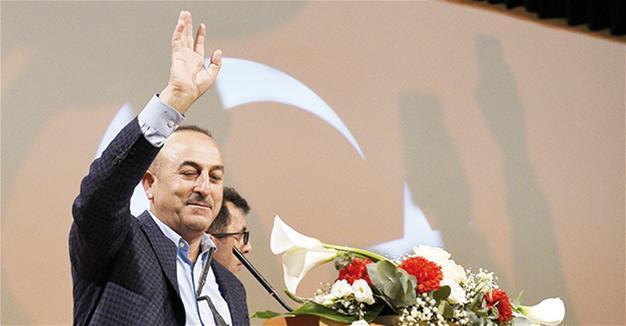Turkey-EU ties going through difficult phase: FM Çavuşoğlu

AFP photo
Turkey’s relations with Europe have been passing through a difficult phase due to Europe’s stance on the April 16 referendum and last year’s coup attempt, Turkish FM Mevlüt Çavuşoğlu has said.
“Our relations are going through a difficult phase, as the attitude of the EU and some European countries has been a great disappointment,” he told Arab daily Asharq al-Awsat.
“Instead of receiving solidarity and support, Turkey has faced unfair criticism concerning measures it took in the aftermath of the aborted coup,” he said.
“Some European countries have spared no effort in presenting difficulties that would keep Turkish ministers and deputies from meeting with their own citizens, while the [outlawed Kurdistan Workers’ Party] PKK and affiliated groups are permitted to demonstrate and display their symbols freely,” Çavuşoğlu said.
“This is a clear example of double standards,” he said.
“It is also disappointing for us to see that Turkey very often becomes an issue in domestic politics of some European countries, particularly during election campaigns,” he said.
“Issues related to Turkey appear in some European media on a daily basis and predominantly from a very negative point of view,” he said.
“Political obstacles in the way of our EU accession process are another factor, which causes difficulties in European-Turkish relations. EU membership remains a priority for us,” the foreign minister said.
“There is a loss of trust toward the EU in Turkey, stemming from the EU’s latest attitude. But we are still expecting positive concrete steps to overcome the confidence crisis,” Çavuşoğlu said.
“Within this framework, we expect the blockages to be lifted, visa liberalization to be granted and all other commitments that the EU has made to be met,” he said. “Yet despite these difficulties, possibilities do exist to put our relations back on a positive track.”
Çavuşoğlu said Turkey would “certainly reciprocate if it is met with good intentions, as well as a positive and constructive approach by the European partners and the EU.”
He also said the further improvement of the Customs Union presented a “vital opportunity” to advance Turkey-EU relations.
“This process will be in the interest of both sides and should not be blocked by political hindrances and shortsighted goals of domestic politics,” he said.
“The EU is now in a process of self-review and integration of cultures and civilizations,” he added. “This process can also be utilized for self-criticism and reform with a view to becoming a stronger entity in world politics.”
Turkey, the foreign minister said, “is ready to contribute to this process as a reliable partner.”
As for last year’s migrant deal with Europe, Çavuşoğlu said: “The March 18 agreement, which has been a success story in the fight against irregular migration, works as a result of Turkey’s tremendous efforts.”
“Among other things, visa liberalization for Turkish citizens was one of the commitments to be addressed by the EU in 2016,” Çavuşoğlu said.
“We’ve been undergoing the visa liberalization process since 2013 and have fulfilled almost all conditional benchmarks. This was acknowledged by the European Commission in its report dated May 2016. However, we see no will on the EU’s side to move forward on this issue; this is also the case with other commitments it made,” he said.
“We have prepared a working plan for the preparations to be made for the remaining benchmarks,” Çavuşoğlu said.
“We will present this plan to the EU, which will in turn constitute Turkey’s final proposal in order to complete the visa liberalization process,” he said.
“If the EU does not give a green light on this issue, we will be obliged to review the heavy burden we assumed in the Aegean Sea,” he said.
